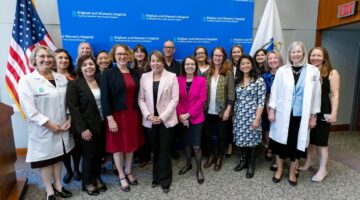
Born three months premature in 1987, Joshua Curhan spent two months in the Newborn Intensive Care Unit at the Brigham, where he was diagnosed with hearing loss.
Eight years ago, Joshua’s parents, Gary Curhan, MD, ScD, and Sharon Curhan, MD, MSc, physicians and epidemiologists at the Brigham, co-founded the Conservation of Hearing Study (CHEARS), an offshoot of the Nurses’ Health Study.
“Many people think all hearing loss is due to aging or noise, but that’s not true,” Gary says. “Most risk factors we found are modifiable, showing that hearing loss may not be inevitable.”
Fueled by hearing test results conducted on nearly 4,000 people and self-reported information from more than 200,000 people, the research duo determined that many factors beyond age and noise exposure influence hearing loss and tinnitus, a condition marked by chronic ringing in the ears. Hearing loss is also affected by pain reliever use, vitamin intake, diet, hormone use, exposure to heavy metals, and physical activity.
Sharon says, “By combining our firsthand experience as parents of a child with hearing loss and our research training in medicine, neuroscience, and epidemiology, Gary and I have found our mission—to find ways to prevent hearing loss and to improve the detection and management of ear and hearing disorders.”










